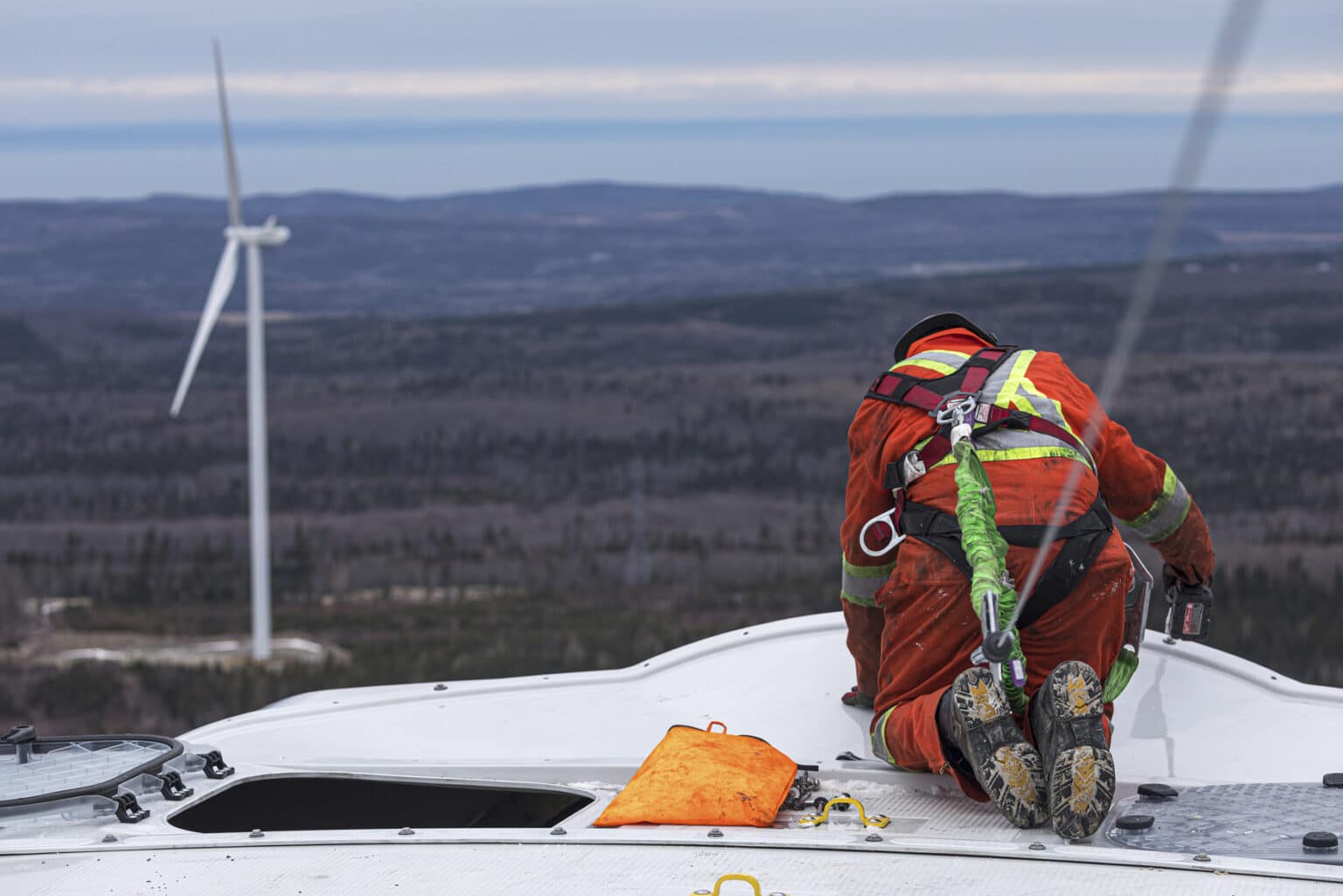By Tara Lohan, The Revelator. This story originally appeared in The Revelator and is part of Covering Climate Now, a global journalism collaboration strengthening coverage of the climate story.
Do we generate energy from windmills or wind turbines? Your answer could say a lot about your views on climate change, explains Genevieve Guenther.
Guenther used to be an English professor and literary critic, specializing in the Renaissance. But a growing concern about the climate crisis caused her to switch gears — and her research — to climate communication.
Now she studies right-wing messaging on climate change — like pundits’ use of windmills to imply that wind energy is an outdated technology. She also founded End Climate Silence, an organization focused on strengthening climate change reporting and ending fossil fuel advertising in the media.
She spoke to The Revelator about what inspired her career shift, how climate change reporting has evolved, and her recommendations for how to encourage climate action.
How did you go from being an English professor to a climate activist?
I got super concerned about the climate crisis after I became a mom. My son was born in 2010, which means his life is going to play out over the 21st century. So many of these catastrophic impacts from global heating that are projected to come down the pike, if we don’t stop using fossil fuels, are really going to hit him and his generation.
I started getting concerned about it — and I started to be concerned in particular with climate communication — because my background is in literary analysis research into how language has political effects, how it creates political dispositions.
I started to read the psychology and the sociology of climate communication. I took online courses in climate science through the edX platform. I did Al Gore’s Climate Reality Project.
I wasn’t quite sure what my role in this fight was going to be, but then in 2017 The New York Times hired columnist Bret Stephens, who at the time was on record as being a climate denier. I was so shocked that the paper of record thought that climate denial was legitimate political commentary that I actually started a petition on Change.org trying to get them to rescind his offer.
Lots of other people were really upset about this, too. The petition quickly got up to 20,000 signatures and I started using Twitter to promote it and in the process I got connected to climate scientists who also had written an open letter to the Times protesting Stephen’s hiring and then other activists and then climate journalists.
How did all of this lead to the organization you started — End Climate Silence?
When Stephens went on to publish his first column, I had this insight about why the uncertainty messaging of the right wing had been so effective, which was something that I felt like I was able to see because of my background in literary analysis. And so I came up with an idea for a book project, which I’m now writing, called the Language of Climate Politics. I realized that part of the reason that right-wing climate denial gets purchase in American culture is not just because the media is polarized, but also because the supposedly legitimate news media isn’t really talking about the climate crisis at all.
They’ll frequently run stories that are clearly climate stories about extreme weather or about energy or geopolitics or even immigration. And they’ll even describe how the climate crisis is affecting what it is they’re reporting on, but they’ll never actually mention the words climate change. And so to me, it felt like part of the problem with raising political will is that people don’t realize that climate change is happening already in the United States — and accelerating.
That’s because the news media isn’t reporting on the climate crisis accurately and with urgency. So I founded this little volunteer organization called End Climate Silence, which is dedicated to not only pushing journalists to cover the climate crisis more frequently, but also to change the paradigm for climate coverage so that it’s not seen as a kind of science or environment story — or even just an energy story — but it’s the context for almost every story that’s being told at this point in human history.
Since you started End Climate Silence in 2018 have you seen a change in the way the media covers climate change?
Yes. We backed off a bit from trying to reach out to journalists directly in part because I feel like the print news media has really changed the way it’s covered the climate crisis.
Since then The Washington Post and The New York Times have both created really world-class climate desks where some amazing reporting is getting done. Many other mainstream newspapers and magazines also have strong climate reporters now.
They’re also tending to talk about the climate crisis in stories that don’t seem to be [directly] about the climate crisis. So in The New York Times, for example, there was a news item about a baby who was born extremely prematurely. He was a twin and his sister died within 24 hours. And by way of telling his story, they also pointed out that the climate crisis is making prematurity worse — especially in the South — and gave the reasons why. That’s exactly the kind of contextualizing coverage that we were hoping to see more of.
The print media has also started to note that fossil fuels are the primary cause of the climate crisis, which is also something new. They used to use the euphemism human activities.
I’m really happy to see that shift as well, but the broadcast news media — the network primetime news and cable news — are still basically performing climate denial on the airways every night.
[For awhile] we had changed our focus to the broadcast news media but had no success whatsoever. Part of it, I think, is because television executives don’t want to alienate their fossil fuel advertisers. There’s a lot of fossil fuel advertising on television.
Then of course there’s Fox News, which talks about the climate crisis actually quite a lot, but only to deny its existence or attribute it to left identity politics and the destruction of the United States.
All of those polarizing effects get amplified by social media where Twitter and Facebook and Instagram just put content in front of you that they know that you’re going to like. So you never see opinions that you would disagree with.
This kind of polarization, which we think is what’s keeping our climate politics stuck, is actually not the problem. The problem is that the center — like The New York Times — is actually still allied with the fossil fuel industry. And that means they’re allied with the right where the climate crisis is concerned. Our politics are stuck because the fossil fuel economy is still the norm and nobody has done anything really yet to change that.
That’s why our latest project is an attempt to get The New York Times to stop making advertisements for the fossil fuel industry. We started with the Times because we’re hopeful that it would actually move on this, but also because it’s deeply embedded in creating fossil fuel propaganda for the oil and gas industry through its T Brand Studio. In our view, the better the journalism, the more credibility it gives to fossil fuel advertising.
In yesterday's Congressional hearings into fossil-fuel disinformation, Chairwoman Maloney cited ads made by the @nytimes as evidence of Exxon's history of spreading lies about #ClimateChange.😮😮😮@TBrandStudio, don't you think it's time to stop making the #AdsNotFit2Print? pic.twitter.com/QhdmOyYrAW
— Dr. Genevieve Guenther (@DoctorVive) October 29, 2021
How have you seen fossil fuel proponents use language to upend climate action?
Words have two different levels. They have the denotation level, which is what they mean in the dictionary sense. Like if you say a windmill is a machine that uses wind to generate motion or something like. But then there’s what the word windmill implies.
If you say windmill, I imagine an 18th century Dutch painting or something. That’s why right-wing commentators have started calling wind turbines windmills, right? Because they want you to feel like these extremely tall and sweet and even futuristic pieces of technology are these antiquated, homespun, rinky-dink little things that you might see in a Dutch painting. So that’s what they’re doing now — they use words that imply a belief that they want the public to hold.
And then there’s the greenwashing, which is done by pretending that the oil and gas companies are actually researching and implementing climate solutions, most of which are false solutions.
Simultaneously [fossil fuel] trade groups are going behind the scenes to lobby against climate policy in Congress and buy billions of dollars of advertising on social media to reduce support, or even generate opposition, to the climate policies that they’re lobbying against on the Hill.
What advice do you have for climate communicators?
Very often climate communicators will talk about the climate crisis and its solutions in terms that they know that Americans already like. Climate change is a threat to the economy, the solutions are a job creator, everybody likes clean air and water.
So they talk about decarbonization as something that’s going to bring clean air and water or other economic benefits. To my mind, that’s a mistake because it’s apolitical.
We shouldn’t be trying to bring on board the people who’re not already on board. Instead we should be trying to activate the vast majority of people who’re already concerned or even alarmed about the climate crisis but haven’t yet started exerting political pressure on their workplaces or on their government.
I think that communication should try to inspire the already-concerned into action.
And I think that you do that by telling the climate story as a kind of epic story of good and evil, where a band of people — who we invite you to join — are doing everything they can in their scrappy way to try to overthrow an evil empire and found a new world.
The way you do that is you talk about the climate crisis and show how it’s a personal threat to you. And especially to your children. And if that creates a kind of fear in your listener, there’s really no way around that.
But you don’t want to just scare them and leave them there. You also have to activate them into a sense of agency. And for me, the way that I think people do that the best is by inspiring outrage so that you understand that this threat is due to the actions of some people who are profiting off of your victimhood.
Then you also have to talk about what people often only talk about, which are the enormous benefits of decarbonization. They won’t be benefits for everybody. Of course, the fossil fuel industry is not going to benefit. The very wealthy who spend carbon like there’s no tomorrow — who’re insuring there is no tomorrow — they’re probably not going to benefit, at least not economically, from climate policy.
But the rest of us, most people are going to come out wealthier at the end because they’re going to spend less on electricity and heating and healthcare. There’s a whole way in which we can take this as an opportunity to remake the way our economy works to really make people’s lives wealthier, healthier, and happier in all the ways that research shows people really care about.
Subscribe to our newsletter
Stay up to date with DeSmog news and alerts







